 |
 |
|
 |
A message from Doug Weiszhaar |
 |
 |
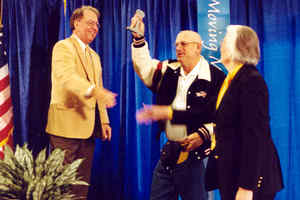 |
Acting Commissioner Doug Weiszhaar, left, presents Gov. Jesse Ventura
with a rail tie commemorating the governor's strong support of light
rail transit. Ventura and Lt. Gov. Mae Schunck, right, visited the Transportation
Building in St. Paul on Oct. 31 to thank Mn/DOT employees for their
dedication during the past four years. Photo by Craig Wilkins
|
The face of political leadership in Minnesota changed overnight—and with it,
quite possibly, the future of transportation in Minnesota. Come January, we
will have a new governor, new majority leaders in the Legislature and a new
man representing us in the U.S. Senate.
The question on all our minds is: How will this affect us at Mn/DOT?
The short answer is that we’ll have to wait and see. Every gubernatorial election
brings changes to state agencies, and Mn/DOT employees will adjust to the new
challenges—whatever they may be—just as we always have.
Governor-elect Tim Pawlenty and running mate Carol Molnau, in their leadership
roles in the Minnesota House, have demonstrated a keen interest in transportation.
Therefore, it is likely that transportation issues will continue to be a high
priority, although the focus or approach to solutions themselves may change.
For more information, see Pawlenty’s
stance on transportation issues.
Mn/DOT’s funding future
Besides the election and its implications, another issue of great importance
to state employees is the budget. For FY 2004-05, the Department of Finance
projects a $3 billion shortfall for the General Fund. In the past, Mn/DOT has
not been as severely affected by the cuts as other agencies because our funds
come primarily from the Trunk Highway Fund; only one percent comes from the
General Fund.
This time around, however, Mn/DOT will feel the constraint of the projected
financial shortfall.
On Oct. 15, Mn/DOT presented recommendations to the Department of Finance on
how to cut our budget by 10 percent, and we outlined the impacts of those cuts—including
the reduction of nearly $72 million in the construction program.
For both FY 2004 and FY 2005, we will be asked to eliminate $1.3 million from
our operations budget as part of the 10 percent budget cuts.
To complicate matters further, the Legislature may decide to return Motor Vehicle
Sales Tax funds (about $200 million per year) to the General Fund. This is money
Mn/DOT receives from the Trunk Highway Fund to cover revenue lost as a result
of the reduced license tab fee legislation enacted a few years ago.
Despite the bleak budget situation we face, Mn/DOT has taken steps to minimize
the impact. We’ve streamlined and prioritized our work and eliminated services
that didn’t fit with our core business activities. We’ve adjusted how we operate
through change management and other staffing changes.
As we move forward, we need to continue to streamline and find ways to make
our operations more efficient. I know that people will ask about layoffs, and
I continue to stress that layoffs will be a last resort. However, Mn/DOT will
not be immune from staff cuts.
I recognize the coming months will be filled with uncertainty but our vision
remains steady—we need to deliver on Minnesota’s transportation needs and provide
transportation choices. We need to preserve our existing roads and highways.
I’m the first to say it is going to be difficult to get there, but I know Mn/DOT,
and I know the pride and innovation of the employees who work here. We’ve been
doing the right thing for the past four years. Let’s keep moving forward.
—Doug Weiszhaar, acting commissioner
|
back

|
 |
First set of roundabout interchanges offers fewer crashes,
increased safety |
 |
 |
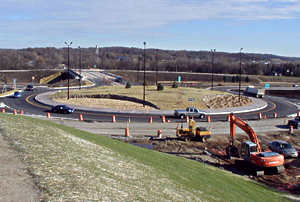 |
Minnesota’s first set of roundabouts takes form at the interchange
connecting Steele County Road 12 and I-35 near the Medford Outlet Mall.
Photo by Brian Jergenson
|
Mn/DOT opened its first set of roundabouts on the I-35/Steele County Road 12
interchange near Medford on Nov. 1. Designers chose the roundabout design for
the interchange because of increasing traffic levels near the Medford Outlet
and the need for a new bridge over I-35.
Roundabouts are updated versions of the traffic circle and can improve traffic
flow while reducing the number of crashes. The design also encourages lower
driving speeds, giving drivers more reaction time and decreasing the severity
of crash injuries.
Roundabouts follow the yield-at-entry rule. Drivers approaching a roundabout
wait for a gap to enter. Cars enter and move throughout the roundabout in a
counterclockwise direction using only right turns until they exit, said Steve
Kirsch, district state aid engineer. There are no stoplights or stop signs within
the circle.
The roundabout project is part of a $3.1 improvement that includes a new bridge
over I-35 as well as new ramps, frontage roads, bike paths, lights and landscaping.
The roundabouts are next to the Medford Outlet Mall in Medford, about halfway
between Faribault and Owatonna on I-35.
There are about 300 roundabouts in the United States and more than 35,000 worldwide.
By Craig Wilkins
|
back

|
 |
Rochester awards contract for first design-build, best-value project on Hwy 52
|
 |
 |
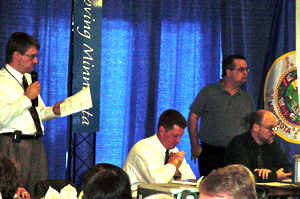 |
From left, Paul Huston, design-build project manager, Technical Support,
conducts the Hwy 52 bid letting session as project co-managers Jon Chiglo
and Terry Ward (seated) take notes. Tony LaMusga, Pre-Letting Unit (standing)
assists. Photo by Brian Jergenson
|
More than 150 contractors, consultants and Mn/DOT officials crammed into the
Transportation Building cafeteria on Nov. 1 to learn the bid-letting results
for the department’s first design-build, best value road construction project
to rebuild Hwy 52 through Rochester.
The apparent winning bid award went to Zumbro River Constructors with an adjusted
price of $232 million. (Details of the firm’s technical proposal will be released
when the project is awarded.) Construction could begin as early as spring 2003.
Unlike previous bid lettings, each design-build team’s technical proposals
were displayed first. Then the ROC 52 Technical Review Committee opened each
of the teams’ design-build price proposals. About 20 minutes later, the proposals
from each design-build team were posted on a screen so participants could see
the bids for the base price for the project as well as alternative technical
concept prices.
"The design-build, best-value method gave Mn/DOT a tool to accelerate
the start of this major improvement by one year and compress the reconstruction
schedule from 11 years to five or less," said Doug Weiszhaar, acting commissioner.
For more information about the Highway 52 project, check out the ROC 52 Web
site at http://projects.dot.state.mn.us/hdr/052.
By Brian Jergenson
|
back

|
 |
Second LRT tunnel completed beneath Minneapolis-St. Paul Airport |
 |
 |
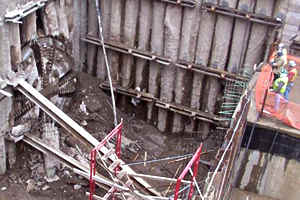 |
Breaking free at last, the tunnel boring machine chewed its way through
the ground to finish the second of two LRT tunnels underneath the Minneapolis-St.
Paul International Airport. Photo courtesy of Metropolitan Airports
Commission staff
|
After more than four months of dark, underground toil, a huge tunnel boring
machine surfaced near the Minneapolis-St. Paul International Airport ’s Humphrey
Terminal on Oct. 26 to complete digging the second of two Hiawatha light rail
transit line tunnels underneath the airport.
The 7,400-long tunnels, each 18 feet, 10 inches in diameter, will allow LRT
trains to travel between downtown Minneapolis and the Mall of America in Bloomington.
Work began on the first tunnel about a year ago.
The boring machine surfaced in late April and was then dismantled and returned
to the north side of the airport. Crews began digging the second tunnel in June
2002.
The German-made boring machine is now being disassembled and transported to
a storage yard in Litchfield where it could be refurbished to prepare for another
tunnel project elsewhere in North America.
Meanwhile, workers will begin building 10 passages connecting the two tunnels,
which are about 20 feet apart. The passages will provide emergency connections
between the tubes. Next summer, workers will install rails and related systems,
first in the southbound tunnel, then in the northbound one.
When service begins in about two years, trains will provide a free rail link
between the Humphrey and Lindbergh terminals, replacing current shuttle bus
service at the airport. The LRT line is scheduled to begin operating in April
2004.
Residents anxious for the start of light rail transit service in the Twin Cities
will have an opportunity to "kick the tires" this month in downtown Minneapolis.
A mock-up, which is half the actual front half of an LRT car, is on display
until end of November in front of the Hennepin County Public Safety Facility,
401 Fourth Ave. S., in downtown Minneapolis.
The display will be open from 11:30 a.m. to 1 p.m. Mondays, Wednesdays and
Fridays to give the public a chance to walk inside, test the seats, see the
operator's cabin and learn about the line’s operation.
By Kent Barnard
|
back

|
 |
Ventura thanks Mn/DOT for vision, commitment |
 |
 |
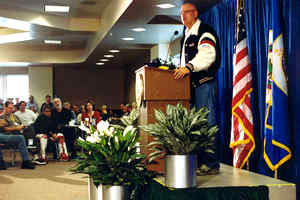 |
Gov. Jesse Ventura thanks Mn/DOT employees for their hard work in
making "Minnesota a leader in transportation." He and Lt.
Gov. Mae Schunck visited the Transportation Building in St. Paul on
Oct. 31. Photo by Craig Wilkins
|
During a farewell visit to Mn/DOT employees in St. Paul, Gov. Jesse Ventura
expressed his thanks to the agency for its work and to former Commissioner Elwyn
Tinklenberg for his advocacy of transportation-related issues.
"Thanks to you in transportation and your very hard work," he said,
"Minnesota is a leader in transportation and a much better place. Without
Mn/DOT, the state would not have as good an economy as it does."
Ventura praised Mn/DOT accomplishments including increasing public involvement
in its activities, Moving Minnesota initiatives such as accelerating
project completion and building the Hiawatha LRT line.
Tinklenberg, he said, served admirably because of his expertise and his passionate
commitment to transportation.
"I believe the Hiawatha LRT that we championed will be a major legacy
for the department," he said. "We’ll look back in 10 or 20 years and
ask how could we not have done it.
"When people think of New York they ask where would it be without its
subways, and when they think of Chicago they ask where would be without its
trains," Ventura said. "Like it or not, the Twin Cities area is a
major metropolis and we need multi-modal approaches to deal with increasing
congestion."
Citing the LRT line as one of his administration’s major legacies, Ventura
said, "People will look back in 10 or 15 or 20 years and ask how we could
not have done it."
Ventura also said that Tinklenberg understood the strong connection between
transportation and the state’s economy and the need for a strong transportation
to increase Minnesota’s competitiveness in a global economy.
"Competition used to mean competing with Wisconsin, Iowa or the Dakotas,"
Ventura said, "but now we’re neighbors. Now we have to compete with the
entire world, which means we must have an effective transportation to move our
goods and services."
By Craig Wilkins
|
back

|
 |
Transit conference honors transportation innovators |
 |
 |
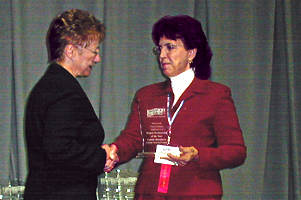 |
Connie Donaldson, director of the LeSueur Heartland Express, accepts
the transit professional of the year award from Donna Allan, Transit
director. Photo by Sue Stein
|
Sponsors of the annual Minnesota Transit Conference honored individuals and
agencies for their commitment to transit at its annual meeting held Oct. 29-30
in Minneapolis. Honorees include Gov. Jesse Ventura and the Metropolitan Council’s
Metro Mobility service.
Ventura earned honors for his commitment to transit such as the Hiawatha light
rail transit line and the Northstar Commuter Coach service.
The Metropolitan Council was recognized for the service Metro Mobility provides
to people who have disabilities.
Other awards went to Connie Donaldson, director of the LeSueur Heartland Express
transit service who was named transit professional of the year, and to John
Dillery, Metro Transit, for distinguished career service.
The Metropolitan Council, the Minnesota Public Transit Association and Mn/DOT
sponsor the annual conference. The event drew more than 250 transit professionals,
government officials, pubic interest groups and transit maintenance and operations
employees participated in the conference.
Speaking at the event, Doug Weiszhaar, acting commissioner, said, "Transit
provides another transportation choice for citizens so they can get to work,
school or doctor’s appointments.
By Sue Stein
|
back

|
 |
‘X’ marks the spot for reducing congestion on I-494 bridge |
 |
 |
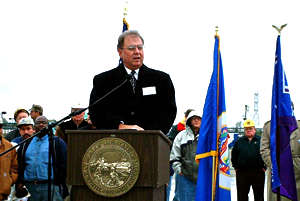 |
|
Acting Mn/DOT Commissioner Doug Weiszhaar commended planners and construction
crews for meeting a very tight schedule at the dedication of the new
Penn Avenue bridge over I-494 between Richfield and Bloomington. Photo
by Kim Lanahan-Lahti
|
A new and uniquely designed "X-shaped" bridge opened to traffic Oct.
31 at one of the most congested "hot spots" in the Twin Cities metro
area: the Penn Avenue bridge that crosses I-494 between the cities of Bloomington
and Richfield just south of Minneapolis.
At the re-opening ceremonies, acting Commissioner Doug Weiszhaar praised the
work of engineers and construction workers who delivered the bridge in just
10 months. Mn/DOT partnered with the city of Richfield to deliver the bridge
on an accelerated schedule and finished five years earlier than Mn/DOT’s current
budget would have allowed.
"The city of Richfield, the contractors and Mn/DOT's construction managers
all deserve a lot of credit for keeping this project on a very tight schedule,"
Weiszhaar said. "With record rainfalls and low temperatures, it’s been
a challenging season for construction in Minnesota."
Meeting tight deadlines on this fast-track schedule allowed Richfield and Mn/DOT
to open the bridge just weeks before the holiday season draws shoppers to the
Southtown Shopping Center and a Target store nearby. The Oct. 31 reopening also
beat a December opening of Best Buy’s new corporate headquarters, which will
add 5,500 commuters to the traffic mix.
Balancing commercial needs with traffic management at this real estate hot
spot is tricky. The old Penn Avenue bridge carried 22,000 vehicles a day during
non-holiday months before it closed in January 2002. Bridge traffic had then
overflowed onto the streets of Bloomington and Richfield during rush hours and
blocked motorists trying to exit from I-494 as well.
Traffic on the new bridge will flow through a "single-point diamond interchange"—an
"X" shaped crossing —with traffic signals at the center of the "X."
The eight lanes constituting "spokes" of the "X" can hold
more vehicles than the old six-lane bridge, which should reduce spillover onto
nearby city streets.
By Marsha Storck |
back

|
 |
Butson appointed as Willmar’s maintenance superintendent |
 |
 |
Jeff Butson, maintenance supervisor at Hutchinson, was promoted to serve as
Willmar/District 8’s maintenance superintendent. He succeeds Jack Gilb, who
will retire in January.
In his new position, Butson will direct the district’s maintenance activities,
including operations, inventory and building maintenance. He will also represent
maintenance on the district’s operations team.
Butson said the district will increase its use of anti-icing this winter as
the supervisors and staff become more familiar with its application.
Butson began his career as a highway technician with the Mankato District following
graduation from the Mankato Technical College with an associate’s degree in
civil technology. He was appointed as supervisor at Hutchinson in 1997.
Butson may be reached at 320/214-3686
By Craig Wilkins |
back

|
 |
Hand safety initiative promoting work gloves helps reduce injuries |
 |
 |
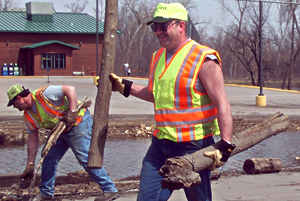 |
Mankato maintenance crewmembers wear protective gloves while clearing
debris resulting from severe flooding in 2001. Photo by Rebecca Arndt
|
Hard hats. Reflective clothing. Safety harnesses. Steel-toed boots. Coupled
with alertness and common sense, Mn/DOT’s arsenal of safety gear can prevent
many serious injuries.
But one part of the safety inventory often escaped notice—hand protection.
Mn/DOT issues special gloves, for example, when employees work with corrosive
chemicals or performing tasks such as welding. But day-to-day tasks such as
clearing debris from highways often caused cuts and other injuries to workers’
hands.
The solution: issuing leather-palmed work gloves. Dale Plemmons, Mankato/District
7 safety administrator, said performing common tasks caused seven preventable
hand injuries in 1999.
Following an effort to persuade workers to use gloves, preventable hand injuries
dropped to two last year, he said.
Plemmons said he would often show a shredded truck tire bristling with exposed
steel fibers to reinforce the dangers faced in picking up roadside debris.
Employees’ regular use of gloves reduced the amount of punctures, lacerations
and cuts and abrasions suffered by maintenance crews, bridge workers, construction
workers and sign crewmembers. The action included reviewing and summarizing
federal and state OSHA regulations, the AFSCME contract and Mn/DOT’s safety
and health guidelines to include proper hand protection.
"People are beginning to realize a sense of ownership in the district’s
safety program and to make mindful observation of safety and health practices
part of their daily routines," Plemmons said.
Glove use to prevent injury from handling road debris now comprises part of
the hand protection section of Mn/DOT’s safety guidelines, he said.
The district’s safety efforts earned recognition at Mn/DOT’s annual Bill Yoerg
Quality Recognition Day. Mark Moehlenbrock, safety administrator with Brainerd/District
3 and formerly with Mankato, was also recognized for his work on hand safety.
Larry Thompson, safety director, Human Resources, said Mankato’s actions show
that safety remains a top priority for Mn/DOT and its employees, whether it’s
an office employee sitting in front of a computer or a worker in the field repairing
a bridge.
During the past summer, Thompson and Jim Swanson, assistant commissioner and
assistant chief engineer, made on-site safety visits to all of the districts,
the Metro Division, and the Hiawatha LRT project. Their purpose was to stress
the importance of employee safety to field maintenance and construction personnel.
Both met with safety administrators and other key staff about safety concerns
in each area.
Maintenance and construction workers, Thompson said, report that their major
safety concerns are increasing traffic speeds and volume when working out on
the roads.
"Employees feel like motorists are not respecting workers in work zones,"
he said.
During their visits, Swanson and Thompson found that employees are taking ownership
of their safety programs and supporting safety guidelines.
"This shows that Mn/DOT people accept that the safety program is theirs--not
someone else’s, not the state’s program or Larry’s program, but everyone’s program,"
said Thompson.
Each quarter, Human Resources publishes a newsletter, "Safety Net,"
to share information about safety initiatives and issues with employees. For
more information about safety or to see the newsletter, visit the Human Resources
site on iHUB or call Thompson at 651/296-1362.
By Shayla Cain and Craig Wilkins
|
back

|
 |
Dinner to honor former Commissioner Elwyn Tinklenberg |
 |
 |
A dinner sponsored by the Minnesota Transportation Alliance to honor former
Commissioner Elwyn Tinklenberg for his service and leadership at Mn/DOT will
be held Thursday, Nov. 14, at the Hilton Minneapolis North at 2200 Freeway Boulevard
in Brooklyn Center.
A reception begins at 4 p.m.; dinner follows at 5 p.m. Cost for the event is
$35 and covers both the dinner and a gift.
To attend, send a check to the Minnesota Transportation Alliance, 2515 Wabash
Ave., St. Paul, Minn., 55114, by Nov. 11. For more information, call 651/659-0804.
|
back

|
 |
|
 |



